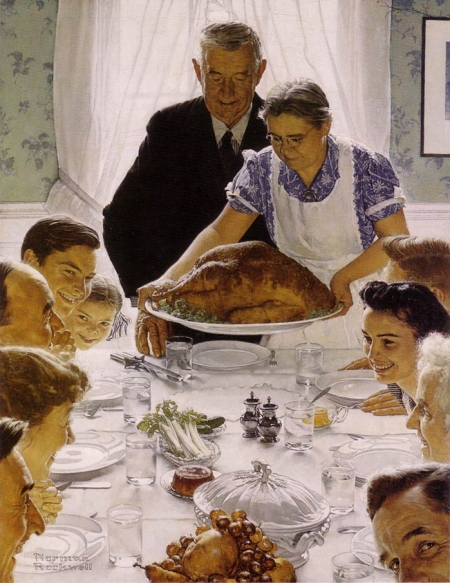 The image above, is of course, from the by the wonderful  Norman Rockwell, from his 1943 drawing “Freedom From Want.” As a graphic artist I was inspired and drew much inspiration from his wonderful evocative work.  For so many, Rockwell captured the essence of people, their actions and emotions, in a way no one else could. Often depicting “the ideal”. For many the holiday season is about family and traditions—eggnog, movies, food, caroling or just reminiscing. One of the traditions that carries from year to year might involve past disagreements and sensitive subjects. You can avoid the negativity this season with some helpful advice from Dr. Linda Enders, associate professor of human development and family studies at The University of Alabama. [continue reading…]
The image above, is of course, from the by the wonderful  Norman Rockwell, from his 1943 drawing “Freedom From Want.” As a graphic artist I was inspired and drew much inspiration from his wonderful evocative work.  For so many, Rockwell captured the essence of people, their actions and emotions, in a way no one else could. Often depicting “the ideal”. For many the holiday season is about family and traditions—eggnog, movies, food, caroling or just reminiscing. One of the traditions that carries from year to year might involve past disagreements and sensitive subjects. You can avoid the negativity this season with some helpful advice from Dr. Linda Enders, associate professor of human development and family studies at The University of Alabama. [continue reading…]
Stress
You couldn’t ignore the news if you tried. The economic crisis is all over magazines, newspapers and television news programs. So, it’s no wonder people are feeling anxious and stressed out.
But women may be reacting more strongly than men. A recent survey from the American Psychological Association (APA) called “Stress in America” says women are expressing fear about the current financial situation more than men. [continue reading…]
 Elderly people who have a positive outlook, lower stress levels, moderate alcohol consumption, abstention from tobacco, moderate to higher income and no chronic health conditions are more likely to thrive in their old age, according to a study in the October issue of the Journals of Gerontology, Medical Sciences. [continue reading…]
Elderly people who have a positive outlook, lower stress levels, moderate alcohol consumption, abstention from tobacco, moderate to higher income and no chronic health conditions are more likely to thrive in their old age, according to a study in the October issue of the Journals of Gerontology, Medical Sciences. [continue reading…]
Corisol helps our bodies cope with stress, but what about its effects on the brain? A new study by Cohen and colleagues, appearing in the October 15th issue of Biological Psychiatry, suggests that the answer to this question is complex. In an animal model of posttraumatic stress disorder (PTSD), high doses of a cortisol-related substance, corticosterone, prevented negative consequences of stress exposure, including increased startle response and behavioral freezing when exposed to reminders of the stress. However, low-dose corticosterone potentiated these responses. This finding suggests that corticosterone levels may influence both vulnerability and resilience in a dose-dependent manner through its involvement in memory processes. [continue reading…]

